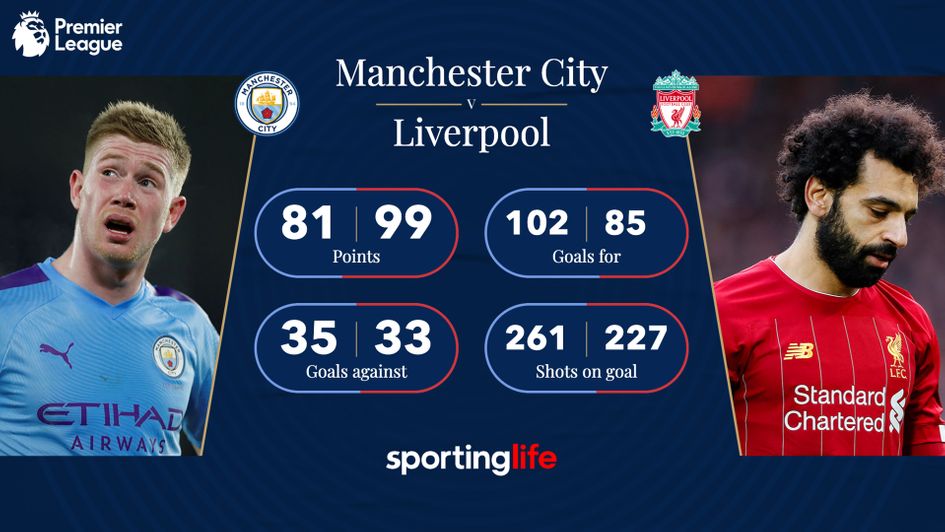Complete the sequence: 100, 98, 99…? The correct answer will denote the final points tally of the 2020-21 Premier League champions. The chances are that it will be high. Since Chelsea claimed 93 in 2016-17, it has always been in the nineties. A three-year average of 99 means, on average, they drop a mere 15. The margin for error is minimal.
Logically, that points to a straight fight between Liverpool and Manchester City, the two teams who have shown they can chalk up at least 30 wins in a campaign. Recent form suggests that, while neither will have a proper pre-season, the start is imperative: City only dropped two points in their first 20 games in 2017-18, Liverpool two in 27 two years later. The alternative route is to finish with a flourish and City won their last 14 matches in 2018-19.
But there is evidence sustaining such success is not sustainable. One of Liverpool’s challenges after taking 196 points in two years is combatting third-season syndrome, which afflicted City last season: after 198 points in two years, Pep Guardiola’s team slipped to 81 last season. Likewise, Chelsea only claimed 83 after earning 186 in their first two campaigns under Jose Mourinho.
Chelsea were waylaid by draws in that third year, City by defeats last season. It offers the most obvious area for improvement. They lost nine times last season; in contrast, the last three champions have nine defeats over those campaigns, an average of three per year.
For City, a return to consistency is required. That entails improving the defensive record. They conceded the fewest shots per game last season (7.4) and their goalkeepers had the same save percentage as Liverpool’s (70.1) but victorious opponents often scored from a majority of their attempts on target. It reflects that the quality of chances they permitted: City’s expected goals against was 37.00, compared to 24.51 and 25.73 in their two title-winning seasons. With a fully-fit Aymeric Laporte, the signing of Nathan Ake and the potential arrival of Kalidou Koulibaly, City are likely to be more frugal.
And yet the case for City is that, even before factoring in the now unlikely possibility of getting Lionel Messi, is that they have never been more creative. They ‘win’ the league on expected points every season under Guardiola. Their expected goals has risen annually, from 79.85 to 91.43 to 93.72 to 102.21. As with the games they lose, it is in part a question of when chances are taken: they ‘won’ on expected goals, often by large margins, in five defeats and all three draws last season.

Liverpool were their opposites, the kings of the close encounter. They had five league wins with a lower xG last season. They only led for 109 minutes more than City but claimed 18 more points, and were ahead for 20 minutes less away from home, where they took 10 more points. They claimed 14 wins by one-goal margins, all before the title was secured.
City are likelier to thrash a side – they scored at least five goals seven times to Liverpool’s two – but their struggles in tighter encounters were part of their undoing. City won nine matches by one goal in each of the previous two campaigns but only six last season. They conceded goals in the last 20 minutes of five defeats and two draws last season whereas Liverpool had two injury-time winners, plus others in the 85th, 84th, 78th and 75th minutes. City conceded three times as many goals – nine – in the last 10 minutes of games.
And yet if late winners and an ability to hold your nerve in tight games tend to be hallmarks of champions, there was something freakish about Liverpool’s form. It is safe to say no one will start with 26 wins in 27 again or take 106 points from a possible 108, as Liverpool did over two seasons.

Liverpool over-performed their expected points by 24.72 last season, the most since such statistics were compiled in the Premier League. Realistically, that is unrepeatable. There is a statistical case for saying they were better in 2018-19, even before factoring in their Champions League win. Their expected goals for was higher (79.46 to 75.19) and against was much lower (29.15 to 39.57).
In part, that may be because more was riding on every match. Their statistics were skewed in summer because they clinched the title with seven games to go. Perhaps the lack of competition stripped them of their edge, but five teams took more points and their expected goals against, of 10.88, was bettered by seven others, including Aston Villa. They had an average xG of 2.10 per game with fans and 1.57 without.
It might not be an omen for the forthcoming season, but the pertinent part is whether a team who play with their intensity and possess their bond with the crowd need an atmosphere more than most. In comparison, City could flourish in a void. They were even more prolific without crowds, averaging 3.4 goals per game. They only conceded four times in 10 matches, even if that did bring two losses.
The numbers suggest a world without supporters or with largely empty stadia should suit City. But if the figures suggest they should always win the league, the probability that it will need a minimum of 90 points shows their fate may rest on tightening up defensively and avoiding defeat in games they dominate.






